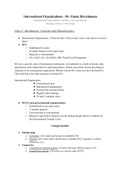International Organizations - Dr. Gisela Hirschmann
International Organizations: Politics, Law and Practice
Tuesday 26 Oct, 13.00: Exam
Class 1: Introduction: Concepts and Characteristics
● International Organizations - What are they? Why do they exist? And why do we need
them?
● IO’s:
○ Established by states
○ (Usually) based on inter-state treaty
○ Regional or international
○ UN, NATO, EU, ECOWAS, IMF, World Food Programme
IO’s are a specific class of international institutions. An institution is a body of norms, rules
and practices that shape behavior and expectations, without necessarily having the physical
character of an international organization. Besides formal IO’s, there are also informal IO’s.
They don't have the same structure as formal IO’s.
International Organization:
➔ Formal treaty base
➔ Bureaucracy/headquarters
➔ Formal rules and procedures
➔ Regular state meetings
➔ At least 3 member states
● NGO’s (non-governmental organizations):
○ Established by non-state actors
○ ‘Common purpose’
○ Local national or transnational
○ Bonobo Conservation Initiative (local), Human Rights Watch, Coalition for
the International Criminal Court
Categorisation:
1. Membership
a. Universal: every state can become a member (UN)
b. Limited: only some states can become a member (EU) (regional or cultural
differences, etc.)
2. Competence
a. Comprehensive/general purpose: IO deals with many different topics (UN)
b. Limited/issue-specific: IO focuses on a specific topic (WTO)
, 3. Function
a. Rule-making organization: makes policy (UN)
b. Operational organization: executes policy (IAEA)
4. Decision-making authority
a. Intergovernmental: decision taken by all members based on horizontal authority
i. Pooled sovereignty (NATO)
b. Supranational: decision taken by organizational body designated by members based
on vertical authority (very practical, but tension-causing as well)
i. Delegated sovereignty (EU)
Organizations move beyond their original purpose, so it's a developing process, and not as
black and white as it now seems.
Three forces of IO’s in world politics:
1. Obligation
a. Direct (obligations that were known from the start (treaties)
b. Indirect (new obligations that arise at a later point, ones that members didn’t
consider when taking part)
2. Compliance: getting member states to get to do what the organization stands for:
their interests can differ from the general purpose of the IO
a. Explicit (less common, a direct mechanism stated on paper, like (automatic)
sanctions)
b. Implicit (more common, pressure in the environment the IO creates)
3. Enforcement: What can an IO do to sanction a member if they don’t comply?)
a. Direct (very few IO’s, serious sanctions like military actions or upholding
income)
b. Indirect (naming and shaming procedures)
IO’s as Actors:
Legally: IGO’s are independent entities with legal personality.
Politically: independent actorness through social recognition.
● Collective actors are able to do what its constituent parts are unable to do
alone.
● Empirically evident through practices of influencing world politics.
IO’s as Fora:
Physical forum/arena for debate and negotiation:
● Exchange of interests and information
● Policy-making
, IO’s as Tools:
Instruments and tools in the hands of their member states, pursuing their own personal
interests. This can cause tensions and problems when one member states interests differ
(greatly) from the common purpose. Like, the International Court of Justice and the IMF.
, Class 2: Theory, Methods and International Organizations
Neorealism:
● ‘Neorealists argue that states would refrain from giving IO’s too much power.’
What is the underlying logic for this argument? (Key: How they conceive the
international system, state interest)
The international system is defined by states. There is no superior power above them because
of the nature of the system and the relationship between states, which is anarchic.
That is why they wouldn’t see IO’s as an actor to the extent of a superior authority, which
makes it impossible to give IO’s too much power, because this would inevitably have to make
IO’s superior, a scenario the states do not recognize to be possible.
The core aspect in the interests of the state is to secure power and security, and by referring
some power to IO’s, that goes against their own interest. Powerful states create IO’s in their
own interest, but keep their power within limits they were mandated to do. States are very
careful when and what they join and agree with.
● Which IO that supports this argument comes to mind?
NATO.
Institutionalism:
(parts of what Hurd describes under liberalism and realism)
● What is similar and different between neo-realists and institutionalists? (Key: Think
about anarchy, the nature of states and the role of IO’s)
Their view is the same when it comes to anarchy. Both sides see the international system as
anarchic, however, they draw different conclusions from it.
States in the realist atmosphere are required to possess more power than others: they are
self-serving (wanting as much power and protection as possible), according to neo-realists..
Institutions think they need to cooperate (for a general and shared goal) and are more willing
to do this because of their interdependence.
Both sides see the system as anarchic, but institutionalists see it as anarchic with
interdependence!




